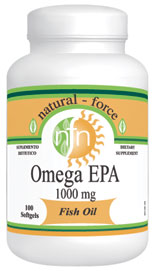
Benefits
- Decreases risk of arrhythmias, which can lead to sudden cardiac death.
- Decreases triglyceride levels.
- Decreases growth rate of atherosclerotic plaque.
- Can slightly lower blood pressure.
- Helps to protect against heart disease.
- Helps improves endocrine function.
- Improves overall health by helping to nutritionally support the natural control of blood lipids, such as cholesterol.
The foods you buy in the market today are almost guaranteed not to contain any (or very little) of the essential fatty acids (EFA’s) that are typically found in fats and oils. The two largest categories of fatty acids are best recognized as the Omega 3 and Omega 6 groups. Both of these essential fatty acid groups are vital for good health. They both perform slightly different functions in the body, most of which are essential for optimal health! Essential fatty acids like EPA and DHA are derived from different sources, and are a part of several chains of metabolic events in the body that prevents disease, assist the transport and uptake of oxygen, maintain brain function, maintain the immune system, cardiovascular health and keep hormone levels where they should be as we age. EFA deficiencies in today’s society are directly associated with cardiovascular disease, cancer, diabetes, multiple sclerosis and other degenerative conditions.
The proportion of these EFA’s in the diet has become very unbalanced toward the Omega 6 side of the scale. This has led to a host of sub-clinical disease states that range from hormonal disruptions to immune dysfunction. The proper balance/ratio of these nutrients is imperative for optimal health. Omega 6 and Omega 3 essential fatty acids are best consumed in a ratio of about 3:1 – that is: three omega 6 to one omega 3.
Omega 6 Fatty Acids (e.g. linoleic acid) These EFA’s are in polyunsaturated fats and are found in unrefined safflower, corn, meat, sesame and sunflower oils.
Omega 3 Fatty Acids (e.g. alpha-linolenic acid) Found in oily fish, linseed or flax oil, hemp oil, soybean oil, pumpkin seeds, walnuts, dark green vegetables.
The diet in the west ranges from between 10 - 20 to 1 in favor of omega 6, which is not good for health. We are eating too much omega 6 fat and not enough omega 3 fats. This increase and excessive intake of omega 6 can cause increased water retention, raised blood pressure, an increase in allergic responses and increased blood clotting. Studies have shown that taking EPA+DHA everyday significantly reduces deaths from heart disease.
Recent nutritional research has revealed important new evidence that a concentration of these marine lipids in the diet improve overall health by helping to nutritionally support the natural control of blood lipids, such as cholesterol. This helps to protect against heart disease, improve endocrine functions and at the same time support many enzyme functions in the body, which play a key role in neurological functions as well. The Eskimos and other societies with diets rich in fish are known to have a greatly reduced incidence of heart and circulatory disease and it is thought that supplementing with high quality EPA and DHA can help prevent heart disease. †
Packaging: 1000 mg., 100 softgels
Back to Top
†These statements have not been evaluated by the FDA. These products are not intended to diagnose, treat, cure or prevent any disease. |